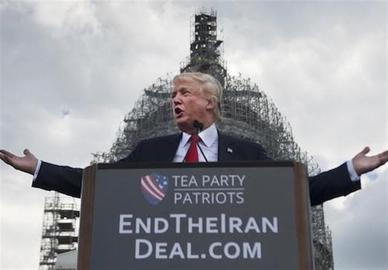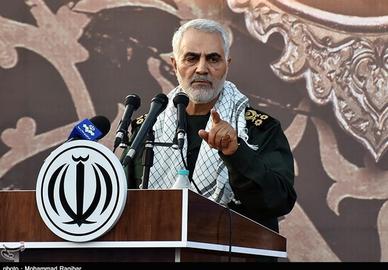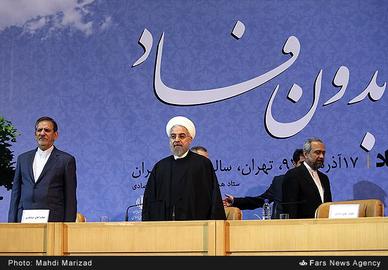In the early hours of July 23, in an all-caps tweet, US President Donald Trump warned Iranian President Hassan Rouhani: “NEVER, EVER THREATEN THE UNITED STATES AGAIN OR YOU WILL SUFFER CONSEQUENCES THE LIKES OF WHICH FEW THROUGHOUT HISTORY HAVE EVER SUFFERED BEFORE.” Three days later, on Thursday, July 26, General Ghasem Soleimani, commander of Iran’s expeditionary Quds Force, hit back with his own tirade against Trump. “It is below the dignity of our president to respond to you,” he said during a speech at a ceremony commemorating the martyrs of the Iran-Iraq War. “I answer you as a soldier. I am a match for you. The Quds Force is a match for you.”
Comparing the tone of the US president to that of a "nightclub owner,” Soleimani said to the audience in a mock address to Trump: “Ask your own security organization and don’t talk about things that you know nothing about...You might start a war today, but we will finish it.” He added that American policies in Afghanistan, Iraq and Lebanon had failed and, referring to the support some members of the Trump administration have expressed for the anti-Islamic Republic group the People’s Mojahedin Organization, he announced that the US has lost its “grandeur”.
General Soleimani also revealed that years ago, he had met with a US emissary in Tehran. “Mr. Trump,” he said, “ask your own commander [about] the time you sent him to Iran [to meet me] — a soldier, not the president of Iran — to ask: ‘Can you give us some time and use your influence so that in a few months our soldiers will not be attacked by Iraqi mojaheds so we can withdraw from Iraq?’”
This is the first time that such a meeting has been reported. It would appear that when he refers to the “commander,” Soleimani is talking about General David Petraeus, who was the commander of United States Central Command from 2008 to 2010. There had, however, been reports that in 2008 Soleimani had sent a message to Petraeus telling him: “I control Iranian policy in Iraq, Lebanon, Gaza and Afghanistan.”
In fact, General Soleimani’s recent statements confirm claims by some American officials that he controls Iranian policies in the region. In recent months, US Secretary of State Mike Pompeo has repeatedly talked about the destructive role General Soleimani plays in the region. “I think the Iranian people are beginning to see that...the Iranian expansionism that the Supreme Leader and Ghasem Soleimani so favor is not what they’re looking for,” Pompeo told the US Senate’s Foreign Relations Committee on July 25. Soleimani’s statements can actually be seen more significantly as a direct response to Pompeo than a reply to Trump’s Twitter rant.
In addition to his sharp attacks on the Trump administration, Soleimani reiterated his support for President Rouhani. “The brave and noble statements by the president were very impressive and anybody who seeks to weaken this course of action and this tone is a traitor,” he told the ceremony attendees. In a letter to Rouhani on July 4, Soleimani had supported his threat to close the Strait of Hormuz if the US or any anyone else tried to prevent Iran from exporting its oil. But this time his support for the Iranian president was more pronounced and categorical. It is clear that Soleimani is trying both to bring Rouhani on side with the Revolutionary Guards and to counter claims by US officials that only a small minority, including Soleimani and the Supreme Leader, seek to increase tensions in the Middle East.
It has been argued that the people of Iran are paying the penalty for the ideologically-inspired policies of the likes of Soleimani, but the commander of the Quds Force has found that the current climate provides a good opportunity to claim that everybody in Iran supports these policies. His support of Rouhani and his bellicose statements are all pieces of a plan to exploit the heightened tensions in US-Iran relations.
In fact, Soleimani once even said that every crisis offers many opportunities. Now he has grasped such an opportunity to consolidate his social and political status, and to cover up his weakness and the problems that his military policies in the region have created for Iran. From this perspective, it is easy to see his speech as being less an adventurist and reckless challenge to the United States and more an example of short-term opportunism.
More on the recent war of words between the Islamic Republic and the US government:
Decoding Iran’s Politics: The 12-Point US Ultimatum, July 6, 2018
Can Iran Legally Close the Strait of Hormuz?, July 5, 2018
The 12 Demands of Pompeo's New Iran Strategy, May 21, 2018
Pompeo to Lay out New Iran Strategy, May 21, 2018
visit the accountability section
In this section of Iran Wire, you can contact the officials and launch your campaign for various problems


























comments